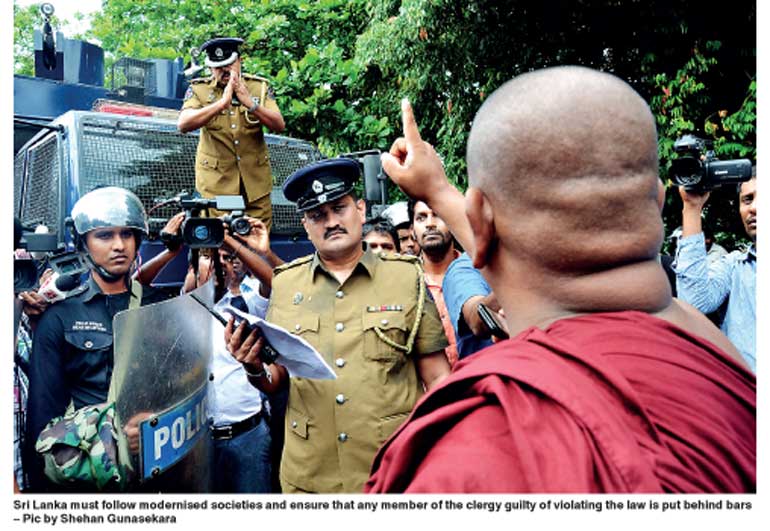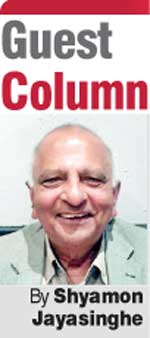Monday Feb 16, 2026
Monday Feb 16, 2026
Saturday, 14 October 2017 00:12 - - {{hitsCtrl.values.hits}}
“If you maltreat a penguin in the London Zoo you cannot escape the law on the grounds you are the Archbishop of Canterbury”
– Lord Bingham
 Buddhist monks are all over
Buddhist monks are all over
The Buddhist clergy are all over Sri Lanka these days! Name a TV channel, and a monk is there. Name a street protest, and a monk is there. Name a subject, and a monk articulates about it. Even if it be the constitution, a monk knows it-although we have only a subcommittee report before us at this stage. It doesn’t matter. Some monk or another will rise up in a stadium and analyse the constitution or what he thinks the constitution is going to be.
The fact is, after the landmark decision of monks to enter parliament under the banner of the Jathika Hela Urumaya it has never been good days for the Sangha. One wonders, what is happening in their temples? Villagers who flock for a pooja? To tie a pirith nool? To seek consolation under the Dhamma? To practice meditation? Where have the monks fled?
Sri Lanka had a short time like this soon after the victory of SWRD Bandaranaike and his MEP in 1956. I remember those days vividly as a youth. However, that era ended with the assassination of SWRD himself by two monks – Somarama and Buddharakhita. Civil society spurned monks for a long time after that. But here, we are now in a repeat of that era. Hope this, too, would not need a tragedy of that sort. The fact that civil society had been able to curb the previous episode is a clue to the solution of Sanga omnipresence. Only organised civil society can curb all this.
Violence
Unlike in the old days, we have Facebook and social media catching images instantly and relaying them to the world. Fortunately, nobody can censure that. A good and effective social control device. The images being splashed daily over social media seem to dramatically question whether Buddhism is any longer the most peaceful religion in the world. What’s the difference from Islamic fundamentalism? Perhaps guns have not yet entered the scene.
Many images show monks lunging forward in hateful manner to shout protests or to assault. I have heaps of them sent to me by friends. If proof be needed I can furnish that.
Some months ago, we had Gnanasara once again in action going at Muslims. This man is so ingenious that he even imported Myanmar’s violent protest -monk called Wirathu to Sri Lanka. That was during the previous regime. Gnanasara is kept under some control now; yet the Government is scared to act against him. When questioned after the Kurunegala episode months ago as to why Gnanasara isn’t arrested despite Court orders to do so, a cop exclaimed: “How can we arrest a Buddhist monk?”
Recently, we had news stories about monks belonging to some Sinhala Jathika Balamandalaya gathering around a safe house where Rohingya Muslims were being kept. These monks lashed out in filth and assaulted some of the Muslims. These hapless Rohingya people and their trailing little families were rescued by our navy and brought to the safe house under UNCFR instructions. However, our knowing monks rushed to the scene and abused the poor folk who had their eyes looking for mercy.
One of the offending monks has been arrested while the other heroic one is in hiding. A nasty Facebook comment on the image of the arrested monk entering the Police van remarks: “Go in the van and reach Nirvana quickly!” Public anger is there, but it is not organised and those against the Government stand aloof or enjoy with vicarious pleasure.
 This sector of monks seem to know everything accept the Dhamma. Where are the four Brahama Viharas of karuna, metta, muditha and upekkha? Could any human treat vulnerable and helpless families so cruelly looking in their eyes that cry for mercy?
This sector of monks seem to know everything accept the Dhamma. Where are the four Brahama Viharas of karuna, metta, muditha and upekkha? Could any human treat vulnerable and helpless families so cruelly looking in their eyes that cry for mercy?
After Gnanasara and before these two anti-Rohingya monks performance we had the case of a high profile monk who was charged with the theft of elephants and also charged with the abuse of the public address system. This case is at large.
The trend seems exponential and we will see more of this unsavoury developments in the future.
Violating the Vinaya and transgressing the law
Violating the Vinaya rules pertaining to the conduct of monks and transgressing the laws of the land are two separate classifications off misbehaviour. As far as the Vinaya rules are concerned, they are supposed to be enforced by clergy authority itself.
On the other hand, the problem about the Buddhist Sangha is that there isn’t any hierarchical command line that can execute this task. It is sharply different with the Christians and Muslims. The Catholics have a strong hierarchy of parish heads, bishops, archbishops – all going up to the Pope in the Vatican. This isn’t the case with the Buddhist Sangha where Mahanayakes are mostly symbolic positions. The individual Buddhist monk thus possesses a free space to act.
In the ancient history of the Sanga, Sri Lanka did have an abundance of individual monks who were thoroughly disciplined and deeply tied to their vocation. They spent their time in temple and in scholarship as our temples became the only formal institutions of learning for a long, long time. It is a different game nowadays. The social and religious scenario is changing radically. No longer are temples the sole institutions of education.
Commercialisation and politicisation has invaded the temples. Monks and temples are being politicised and our politics have been religionised. That is the story in a brief slogan. Fortunately, good monks are still the majority in number and many such spiritual leaders are in the forest hermitage tradition. On the other hand, the evil trend is dangerous for the health of the Buddhist Sangha.
Slippery slope
The connection between Vinaya violation and law violation isn’t all that disparate. There is a slippery slope about permitting even Vinaya violations among monks. That slope has the potential to lead on to violations of the law and to crime. It is just a step or two away. Hence the Government that is charged with the protection of the Sasana and the broad Buddhist masses must take serious note of both types of misbehaviour. Organised civil society at village and urban level can be mindful of the first type. Government must be mindful in particular of violations of the law.
‘Be you ever so high the law is above you’
Regardless of the denomination – Christian, Muslim or Buddhist – if the fundamental principle of people’s sovereignty is to be kept, the law of the people must be above all. Corrupt or murderous politicians – whoever they maybe – must be brought before court and required to account for their public behaviour. The same law must be applied to clergy – however sanctimonious they may be in society.
There was a time in England when a legal understanding prevailed about ‘the benefit of the clergy.’ That went away long ago. The first principle of the rule of law formulated by Thomas Fullers stated: “Be you ever so high the law is above you.” As Lord Bingham explained, “If you maltreat a penguin in the London Zoo, you cannot escape the law on the grounds you are the Archbishop of Canterbury.”
Special influence of the clergy
Actually, in the case of the clergy there is a very special reason for the urgency of the application of the law. What is that? Their psychological influence over followers are potent by virtue of themselves officiating as clergy. In the case of Christians and Muslims, clergy represents a kind of go-between with God.
What happens when communion is given in church? A transubstantiation miracle of turning bread into wine is claimed to occur. What happens at Confession? The priest intercedes with God on behalf of the “sinner,” and gardens the latter under conditions. A whole host of sacraments are administered by the priest. I am not familiar of the details of the clergy in Mosques; it is certain to be characterised similarly.
The Buddhist monk does not play an interceding role as Buddhism is a different corpus altogether. However, he is said to hold the key to spiritual success even as far as the ordinary Buddhist goes. In the case of popular Buddhism, the monk is in charge with numerous ceremonies and ritual and the Sangha is one of the triple gems in Buddhism.
In Sri Lanka, the influence of monks has been compounded by a historical myth that Buddhist monks are protectors of the state. There is much truth in the perception that our monarchs of the past often used to seek the advice of monks in governance matters. Whether that “advice,” had been typically symbolical and a pretence is another matter.
On the other hand, during those ancient times the Buddhist monk represented also the learned community. Today, it is a totally different scenario where the education levels of the broad lay community has generally exceeded that of most monks.
Sexual abuse allegations about Christian priests
The spiritual control of clergy over their faithfuls is, therefore, overt. On the basis of a principle of behaviour that any holder of power has the potential to try and abuse that power such members of a clergy, therefore, are in a position to more easily abuse power in various ways.
Serious sexual abuse of children and women by Christian clergy all over the world have been reported over the years. Court cases in the USA of clerics’ sexual abuse of youth have given rise to over a billion dollars of compensation. In the Republic of Ireland sexual misconduct recently received widespread publicity. The same in Australia where a Royal Commission had to be appointed to go into allegations of the public. The Commission reported widespread and serious abuse. Evidence that the Vatican had protected wrong doers by transfers have also been unearthed in all these countries.
The Archbishop of Australia is fighting for his life facing monumental charges of sexual molestation and abuse. Victims are said to have been pressurised to keep things cover. The result has only led to a repeat of such offences. In international law there is a thing called ‘command responsibility,’ over human rights transgressions. Most of the victims in all these cases have claimed ‘soul damage,’ and persistent trauma.
Conclusion
Sri Lanka must follow these modernised societies and ensure that any member of the clergy guilty of violating the law is put behind bars. The Government must make a forthright announcement so that societal expectations are established. Such a step would also be a further step in progress toward the desired secularisation of our society.
(The writer can be reached via [email protected].)